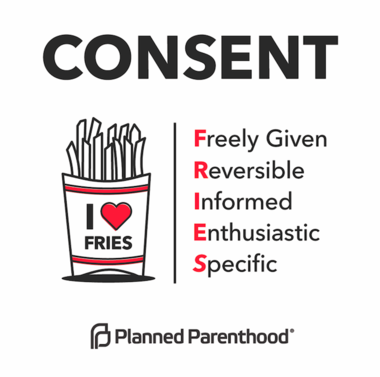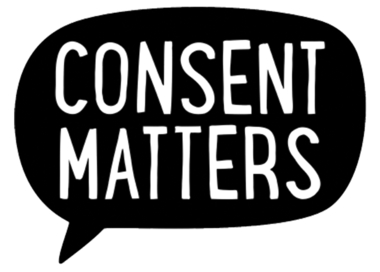The importance of understanding consent

by Jordan Redman
Staff Writer
(Trigger warning – sexual assault)
Consent is more than just agreeing to sexual encounters. People often think consent is only important when it comes to sex. Consent is about always choosing to respect personal and emotional boundaries.
By practicing consent in everyday situations, you signify you value the choices of others.
According to the National Sexual Violence Resource Center, there are several ways to practice understanding consent in day to day life.
For example, ask for consent when touching.
It’s important to ask for consent before hugging, tickling or other kinds of touch. Ask for consent candidly, so others understand it’s okay to say no. For people who have experienced sexual abuse, any unexpected touch can be chilling and traumatic. Others may just prefer more personal space.
Respecting privacy is another important element to valuing consent.

Everyone has boundaries. Some people like to keep things about themselves private. Other people are more open about themselves. If someone shares personal information with you, it’s important to ask what their boundaries are.
Asking permission prevents you from crossing boundaries.
Just like everyone has different boundaries about touch, everyone has different levels of comfort about sharing things online, like photos. It is important to always ask before posting or tagging photos of someone on social media.
When it comes to sex, consent is a must.
Sex without consent isn’t sex. It’s sexual assault.
Consent must be freely given. A person must understand what they agree to, and they can change their mind at any time. Consent needs to be clear and enthusiastic. The absence of “no” or silence does not mean “yes.”
Past consent does not mean current or future consent. A previous hook up is not required to repeat the action based on prior encounters.
When drugs and alcohol are involved, clear consent is not possible. A person who is intoxicated or impaired cannot give consent.
It’s also important to understand how to handle rejection.
Whenever you’re asking for someone’s consent, they could say “no.” Accept the answer and move on. Don’t pressure someone to change their mind. It’s okay to feel disappointed with a “no” answer. But always remember that respecting boundaries is the right thing to do.
In the United States, April is Sexual Assault Awareness Month (SAAM). The goal of SAAM is to raise public awareness about sexual violence and educate communities on how to prevent it.
The misconceptions surrounding consent must be addressed so people can accurately identify when consent has been granted.
For example, a common misconception is: If they didn’t want it to happen, they would have said something or fought back. It must have been consensual since there are no bruises or other physical evidence of assault.
Many people have heard of the fight or flight response as the typical responses to danger. More thoroughly, it is fight, flight or freeze. The freeze response is a documented neurobiological condition also referred to as tonic immobility.
Tonic immobility is a mammalian autonomic response that happens in extremely fearful situations; it is uncontrollable and not something a person decides to do. Research shows that around 50 percent of survivors experience tonic immobility during an assault. Tonic immobility does not mean the sex is consensual.
When it comes to consent, it’s all about respect, respecting emotional and physical limitations of everyone around you.
For more information on consent, visit www.nsvrc.org.
The Gayly. April 7, 2018. 11:04 p.m. CST.





